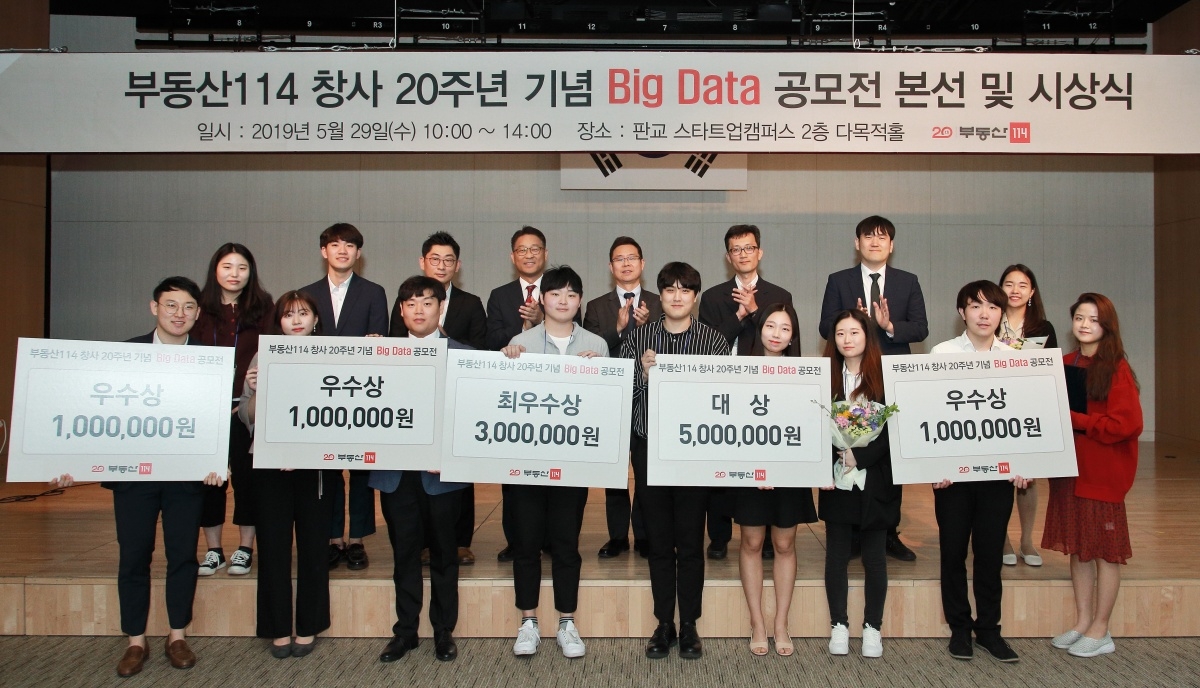뉴스
KUBS 소식
Choi Yoon-Joon (Admitted '17, KUBS) Wins the Top Prize in the Real Estate 114 Big Data Contest
2019.08.12 Views 3098 경영대학
Choi Yoon-Joon (Admitted '17, KUBS) Wins the Top Prize in the Real Estate 114 Big Data Contest
Choi Yoon-Joon (Admitted '17, KUBS) won the top prize in the "Big Data Contest" hosted by Real Estate 114 on the occasion of its 20th anniversary. A contest for undergraduates and graduates nationwide, a total of 199 teams applied, and 54 of them submitted their projects, with one team winning the grand prize, one team winning the top prize, and three teams for excellence. The main competition and awards ceremony was held on May 29th at the Pangyo Startup Campus in Seongnam, Gyeonggi Province.
Winner's Interview

최우수상 수상의 최윤준(경영17) 학우
1. You've presented on the topic of "Real Estate Price Trend Forecasting Model Using Machine Learning." Could you please elaborate on your topic?
We've created a model that can literally predict the trend of real estate prices by using machine learning. By combining REPS 3.0, a data platform that was provided by Real Estate 114, with the macroeconomic indicators provided by the National Statistical Portal or the Bank of Korea's Economic Statistics System, we predicted the trend of real estate prices in almost every region, including Seoul, Gyeonggi, Incheon, Busan, North Gyeongsang, South Gyeongsang, and Jeju. Machine learning techniques such as Support Vector Machine, Linear Discriminal Analysis, Random Forest, and Artificial Neural Network were used as predictive methods.
To give you a specific description of the method we used, we first divided the price change rate data that we wanted to predict into three classes: sUp, Up, and Down. Next, through a graph analysis, we determined whether each column (LTV, DTI, consumer price inflation, turnover, supply, etc.) and class was correlated or not, and only the columns that were significant to the prediction were selected. We used machine learning techniques such as Supervisor Machine, Linear Discriminal Analysis, Random Forest, and Artificative Neural Network to predict whether each of these points belongs to sUP, Up, or Down. Finally, we created the error sequence and ROC Curve to measure the accuracy of the prediction and determine whether the analysis results were significant.
2. Please tell us how you feel about winning the award and some tips for winning.
The biggest force for winning is understanding big data, developing insights, and learning data visualization and machine learning techniques through a course called "Basics of Big Data Analysis and Interpretation" by Professor Jung Howon. Based on what I learned from the professor, I was able to participate in many competitions. Also, when I was looking for information on real estate competitions, I was able to get the necessary data without wandering around because I asked Professor Kim Jae-wook for advice. With the help of our professors, we were able to produce analysis reports that included both data and techniques. Not only did we have a solid report, but also with previous experience of winning two awards, we provided a smooth delivery of the analysis. I believe that is why we were able to receive an award.
I had been worrying if I could do well in studying big data, but this contest was a very meaningful event because I could yield results that helped relieve my anxiety. I was able to gain the confidence to participate in other competitions without hesitation by continuing to study this field.


